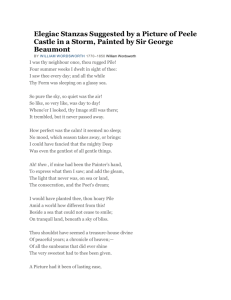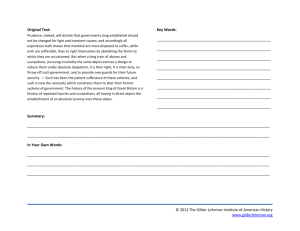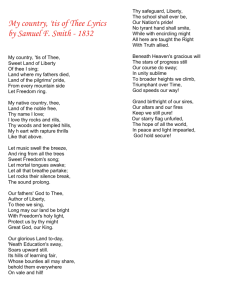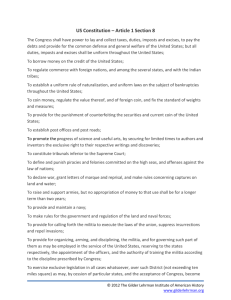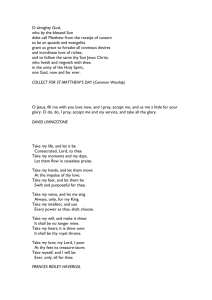My Country, 'Tis of Thee Introduction
advertisement
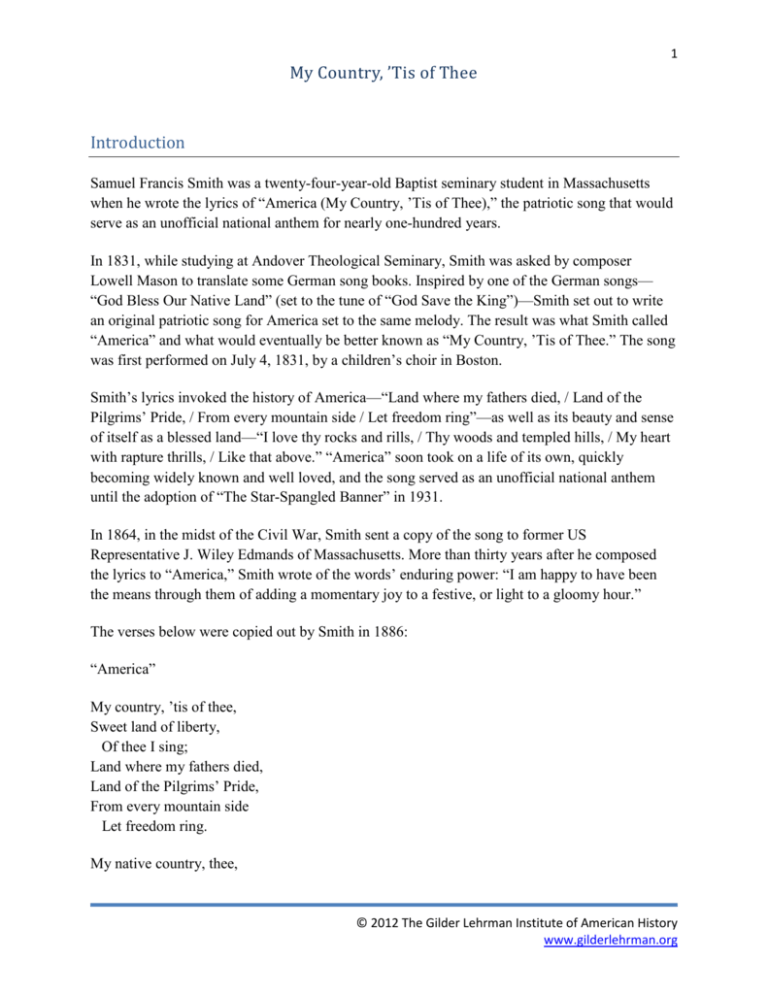
My Country, ’Tis of Thee 1 Introduction Samuel Francis Smith was a twenty-four-year-old Baptist seminary student in Massachusetts when he wrote the lyrics of “America (My Country, ’Tis of Thee),” the patriotic song that would serve as an unofficial national anthem for nearly one-hundred years. In 1831, while studying at Andover Theological Seminary, Smith was asked by composer Lowell Mason to translate some German song books. Inspired by one of the German songs— “God Bless Our Native Land” (set to the tune of “God Save the King”)—Smith set out to write an original patriotic song for America set to the same melody. The result was what Smith called “America” and what would eventually be better known as “My Country, ’Tis of Thee.” The song was first performed on July 4, 1831, by a children’s choir in Boston. Smith’s lyrics invoked the history of America—“Land where my fathers died, / Land of the Pilgrims’ Pride, / From every mountain side / Let freedom ring”—as well as its beauty and sense of itself as a blessed land—“I love thy rocks and rills, / Thy woods and templed hills, / My heart with rapture thrills, / Like that above.” “America” soon took on a life of its own, quickly becoming widely known and well loved, and the song served as an unofficial national anthem until the adoption of “The Star-Spangled Banner” in 1931. In 1864, in the midst of the Civil War, Smith sent a copy of the song to former US Representative J. Wiley Edmands of Massachusetts. More than thirty years after he composed the lyrics to “America,” Smith wrote of the words’ enduring power: “I am happy to have been the means through them of adding a momentary joy to a festive, or light to a gloomy hour.” The verses below were copied out by Smith in 1886: “America” My country, ’tis of thee, Sweet land of liberty, Of thee I sing; Land where my fathers died, Land of the Pilgrims’ Pride, From every mountain side Let freedom ring. My native country, thee, © 2012 The Gilder Lehrman Institute of American History www.gilderlehrman.org Land of the noble, free, Thy name I love; I love thy rocks and rills, Thy woods and templed hills, My heart with rapture thrills, Like that above. My Country, ’Tis of Thee 2 Let music swell the breeze, And ring from all the trees Sweet freedom’s song; Let mortal tongues awake, Let all that breathe partake, Let rocks their silence break, The sound prolong. Our fathers’ God, to Thee, Author of liberty, To Thee we sing; Long may our land be bright, With freedom’s holy light, Protect us by Thy might, Great God, our King. Questions for Discussion Read the introduction and the document and apply your knowledge of American history in order to answer the following questions. 1. Why did the author include the word “free” or “freedom” in each stanza? 2. How can you explain why “The Star-Spangled Banner” became the national anthem and this song did not? 3. How does this song evoke the blessings of God and nature? © 2012 The Gilder Lehrman Institute of American History www.gilderlehrman.org Image My Country, ’Tis of Thee 3 Samuel F. Smith to J. Wiley Edmands, January 29, 1864. (Gilder Lehrman Collection, GLC05508.230.01) © 2012 The Gilder Lehrman Institute of American History www.gilderlehrman.org My Country, ’Tis of Thee 4 © 2012 The Gilder Lehrman Institute of American History www.gilderlehrman.org Transcript My Country, ’Tis of Thee 5 Samuel F. Smith to J. Wiley Edmands, January 29, 1864. (Gilder Lehrman Collection, GLC05508.230.01) Newton Centre Jany. 29, 1864. Hon. J Wiley Edmands, Dr Sir I am happy to comply with your request by sending you the accompanying words for the [illegible]ices. Perhaps their chief merit is the occasion and the circumstances which gave them birth. Such as they are, I am happy to have been the means through them of adding a momentary joy to a festive, or light to a gloomy hour. At the same time I sympathize with yourself and Mrs. E. for the sufferings, and congratulate you on the reception of tidings, of your poor wanderer. When this cloud lifts up a little [2] further, I doubt not light from Heaven will shine on his and on your head. Our country and our government are worth suffering for. May I not say with confidence that I shall find a response, both in your hearts and in his. Blessed are they who have fellowship in this mystery of suffering;—“tolerable,” as, I think, old Polycarp once said,—“tolerable, because not eternal.” Very sincerely yours, S. F. Smith © 2012 The Gilder Lehrman Institute of American History www.gilderlehrman.org Image My Country, ’Tis of Thee 6 Samuel F. Smith, America (My Country, ’Tis of Thee), August 4, 1886. (Gilder Lehrman Collection GLC05508.230.02) © 2012 The Gilder Lehrman Institute of American History www.gilderlehrman.org My Country, ’Tis of Thee 7 © 2012 The Gilder Lehrman Institute of American History www.gilderlehrman.org Transcript My Country, ’Tis of Thee 8 Samuel F. Smith, America (My Country, ’Tis of Thee), August 4, 1886. (Gilder Lehrman Collection GLC05508.230.02) America My country, ’tis of thee, Sweet land of liberty, Of thee I sing; Land where my fathers died, Land of the Pilgrims’ Pride, From every mountain side Let freedom ring. My native country, thee, Land of the noble, free, Thy name I love; I love thy rocks and rills, Thy woods and templed hills, My heart with rapture thrills, Like that above. [2] Let music swell the breeze, And ring from all the trees Sweet freedom’s song; Let mortal tongues awake, Let all that breathe partake, Let rocks their silence break, The sound prolong. Our fathers’ God, to Thee, Author of liberty, To Thee we sing; Long may our land be bright, © 2012 The Gilder Lehrman Institute of American History www.gilderlehrman.org My Country, ’Tis of Thee 9 With freedom’s holy light, Protect us by Thy might, Great God, our King. 1832 S.F. Smith. Aug. 4, 1886. © 2012 The Gilder Lehrman Institute of American History www.gilderlehrman.org

